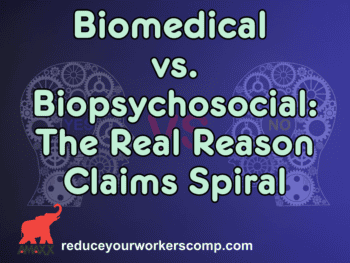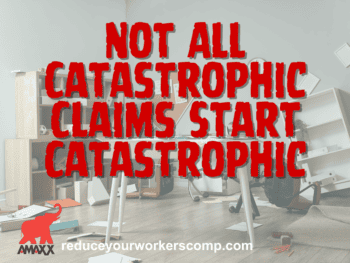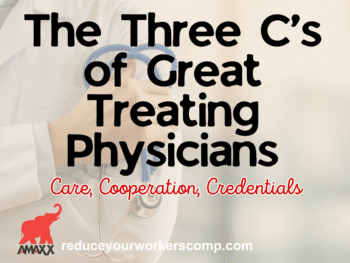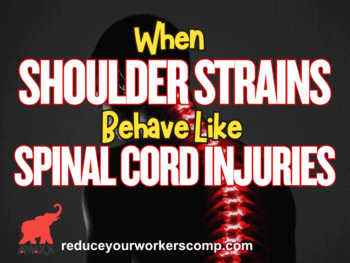
COVID-19 and Workers’ Compensation
Widespread COVID-19 infections in early 2020 led to drastic changes in many workers’ compensation laws across the United States. A survey of state legislatures outlined that nearly half of the states adopted some statutory compensability presumption for frontline medical, police, and other emergency personnel such as firefighters and Emergency Medical Technicians. Under these statutory frameworks:
- Applicable employees were presumed to have contracted COVID-19 related to their work activities following positive tests;
Click Link to Access Free PDF Download
“8 ‘Think Outside the Box’ Tactics to Settle Workers’ Comp Claims”
- Employers could rebut the presumption with medical and other documentary evidence; and
- All non-frontline employees not impacted by a statutory presumption could file claims for workers’ compensation benefits following a positive COVID-19 test but were required to prove compensability.
Many state legislatures place sunset provisions on amendments to their workers’ compensation acts related to COVID-19 presumptions. Employees contracting COVID-19 in the workplace can still make claims but must carry the burden of proof.
COVID-19 and Its Impact on Work Comp
The National Council on Compensation Insurance (NCCI) recently published a study on COVID-19 and its impact on workers’ compensation programs across the United States. This included a review of COVID-19-related claims from 2020 and 2021, where indemnity benefits were paid under compensable claims. This included payments for temporary total and temporary partial disability. This survey document should include the distribution of the following lengths of disability:
- Disability less than 30 days: 16,795 claims;
- Disability 30-60 days: 683 claims;
- Disability 61-90 days: 118 claims;
- Disability 91-180 days: 136 claims; and
- Disability more significant than 181 days: 116.
While it is good news for claim programs that a vast majority of claims filed resulted in short-term disability, the challenge in the future will be the small segment of claims with extended disability. Not only will the challenge be getting these employees back to work, but the additional cost associated with ongoing medical care was not tracked as part of the NCCI study.
Effective Care for Long COVID
The Mayo Clinic, based in Rochester, MN, has been a leader in working with many long-COVID patients across the United States and worldwide. Their program has been designed to explore the causes of it and how to provide effective and efficient medical care.
Based on their research, they have noted common symptoms include:
- Fatigue
- Symptoms that get worse after a physical or mental effort
- Fever; and
- Lung (respiratory) symptoms, including difficulty breathing or shortness of breath and cough.
In addition to the many physical concerns associated with long-COVID that can include blood clots, joint and muscle pain, digestive problems, and dizziness, medical professionals are primarily concerned with the mental health impact of this condition. Patients suffering from long-COVID might have an otherwise normal presentation where others may think there is malingering. The result is confusion, loneliness, and thoughts of suicide or self-harm.
Given these circumstances, all interested stakeholders in the workers’ compensation claim process should confront claims involving long-COVID with care and compassion.
Best Practices for Handling Long-COVID Claims
Claim handlers and employer stakeholders should handle claims involving long-COVID with care and compassion. They should also be aggressive and work hard to ensure the employee receives the best medical care.
- Continue to make a return to work a priority. Coordinate efforts to examine options in light duty work that includes the ability to remain sedentary and take breaks as necessary;
- Monitor all medical care and question whether it is reasonable and necessary. Commonly referred to diagnostic testing such as chest x-rays may not always be appropriate; and
- Determine whether a long-term COVID recovery program is appropriate and agree to provide such care if the employee agrees.
Many unknowns remain about COVID-19 and what medical care an employee might need if the infection prevents full recovery. Members of the claim management team and employer representatives should approach these claims with compassion and evaluate whether leading medical providers spearheading long-term care is appropriate.
Conclusions
COVID-19 may no longer be a global pandemic, but many employees contracted the virus that continues to suffer. Now is the time for stakeholders to embrace these claims with empathy and seek effective and reasonable treatment. This all starts with correct claim identification and is non-judgmental. Efforts should be made to seek the proper care that hopefully provides answers and gets the employee back to work.

Contact: mstack@reduceyourworkerscomp.com.
Workers’ Comp Roundup Blog: http://blog.reduceyourworkerscomp.com/
©2023 Amaxx LLC. All rights reserved under International Copyright Law.
Do not use this information without independent verification. All state laws vary. You should consult with your insurance broker, attorney, or qualified professional.

















